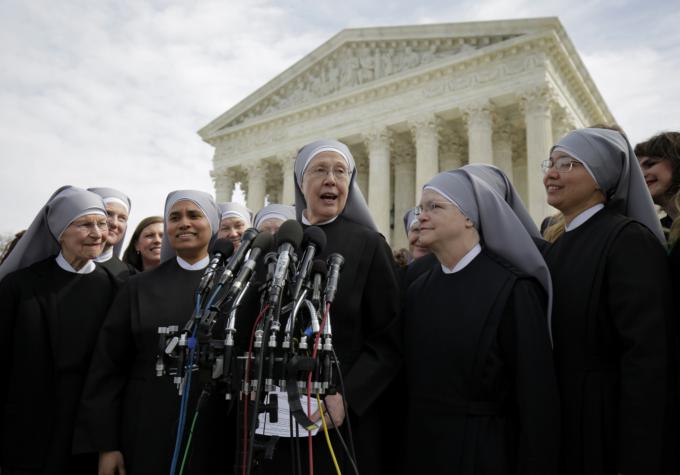
Culture

Duncan
On Jan. 17, the U.S. Supreme Court announced that it had agreed to review a decision of a federal appeals court in Little Sisters of the Poor v. Pennsylvania that overturned a Trump-era exemption for the Little Sisters and others with religious objections to contraceptives. This exemption from the Obamacare mandate would have enabled them to decline to cooperate in the free distribution of contraceptives to any nursing home employees who might want them, in violation of the Little Sisters' religious tenets. Together with Colbe Mazzarella, I filed an amicus brief, urging the Court to review the case, as it cries out to heaven for reversal. Supreme Court review now promises to end the religious persecution of these good religious women. Here's their backstory:
The Little Sisters of the Poor began in the winter of 1839 in Brittany, France, when a woman in her 40s, (St.) Jeanne Jugan, met an elderly blind and partially paralyzed woman and gave up her bed for her. This act began a tradition that has lasted for generations as Jugan continued to take in elderly poor people who had no one to help them. The English novelist Charles Dickens saw her at work, writing later that Jugan was "moved by the gentleness of her heart" to help her first resident. "Other infirm people earned, by their helplessness, a claim on her attention," Dickens recounted. "She went about begging, when she could not work, that she might preserve life as long as Nature would grant it to her infirm charges."
Other women were attracted by Jugan's example, and a religious community to help the elderly sprang up. The Little Sisters of the Poor, as the congregation became known, grew, and spread to other places where they found need -- including, in 1868, the United States.
From the beginning, the Little Sisters have been about not just what they do but how they do it. The Little Sisters do not treat the people they care for as clients, but rather as friends and family. They see themselves not as proprietors or even caregivers, but as joyful servants. They seek neither money nor acclaim. As Dickens noted, "The whole sentiment of the household is that of a very large and very amiable family. To feel that they console the last days of the infirm and aged poor, is all the Little Sisters get for their hard work."
This spirit of joyful and selfless service to the aged poor has changed little since Dickens's time. Writer and neurologist Oliver Sacks, who jokingly described himself as an "old Jewish atheist," wrote just before his death in his 2015 memoir "On the Move: A Life" that the "Little Sisters inspire me, and I love going to their residences. I have been going to some of them, now, for more than forty years."
Sacks came to know of the Sisters through his parents, who were doctors. "I first heard of the Little Sisters when I was a boy, for both my parents consulted at their homes in London. ... Auntie Len would always say, 'If I get a stroke, Oliver, or get disabled, get me to the Little Sisters: they have the best care in the world,'" Sacks recalled.
As an adult, Sacks provided his expertise in neurology for the Little Sisters. He got to know them well:
"Their homes are about life -- living the fullest, most meaningful life possible given their residents' limitations and needs. Some of the residents have had strokes, some have dementia or Parkinsonism, some have 'medical' conditions (cancer, emphysema, heart disease, etc.), some are blind, some are deaf, and others, though in robust health, have become lonely and isolated and long for the human warmth and contact of a community.
"Besides medical care, the Little Sisters provide therapy of every kind -- physical therapy, occupational therapy, speech therapy, music therapy, and (if need be) psychotherapy and counseling. In addition to therapy (though no less therapeutic), are activities of all sorts, activities which are not invented but real like gardening and cooking."
While Sacks did not share the Little Sisters' religious beliefs, he understood that the Little Sisters of the Poor is a Roman Catholic religious congregation, and that the Sisters are animated by their Catholic faith to do what they do. "Religion is central but not mandatory; there is no preachiness, no evangelism, no religious pressure of any sort," Sacks wrote. "Not all the residents are believers, though there is a great religious devotion among the Sisters, and it is difficult to imagine such a level of care without such a deep dedication." In short, the Little Sisters' care for poor residents of their houses is an exercise of their religion, which also serves people of all religions and no religion.
The same religious spirit that animates the Little Sisters' service to poor elderly people also animates their desire not to arrange coverage for artificial contraception to their employees. The Little Sisters believe that artificial contraception is immoral. The Little Sisters also believe that it is immoral to do a bad thing in order to do a good thing. Thus, they can't justify facilitating artificial contraception in order to continue serving the poor people who need their help. That means that the homes that the Little Sisters operate, which so many residents and family members find indispensable, are now in jeopardy. It is imperative that the Supreme Court save the Little Sisters of the Poor from the Big Brother of Government Power, which has been telling them for the past five years, "Do this, or die."
- Dwight G. Duncan is professor at UMass School of Law Dartmouth. He holds degrees in both civil and canon law.
Recent articles in the Culture & Events section
-
Is there any reason I shouldn't do yoga?Father Tadeusz Pacholczyk
-
Scripture Reflection for May 11, 2025, Fourth Sunday of EasterDeacon Greg Kandra
-
Our heart of darknessGreg Erlandson
-
Pope Francis and the persistent habit of 'maybe'Russell Shaw
-
Laying odds on papabili, and our vulgar churchElizabeth Scalia























